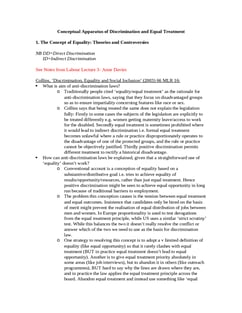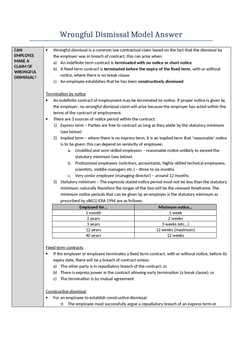Western Excavating v Sharp [1978] ICR 221
Judgement for the case Western Excavating v Sharp
Table Of Contents
Plaintiff was suspended for taking absence without permission. This put him in financial hardship and his request to get his holiday pay early or to get a loan were refused. He therefore left the company so that he could get his holiday pay immediately.
He sued for unfair dismissal and the question was whether or not he had in fact been dismissed, by virtue of s.95(c).
His claim was dismissed, the CA applying a test of whether the employer had breached a fundamental term of the contract. i.e. question of whether Plaintiff had been constructively dismissed (per s.95(c)).
Lord Denning MR
Employer must be guilty of conduct which is a significant breach going to the root of the contract or which shows that the employer no longer intends to be bound by one of the essential terms of the contract.
In such a case the employee is entitled to consider himself discharged from any further duties. He can terminate the contract by reason of the employer’s conduct.
However the conduct must be sufficiently serious and the employee must leave soon after the conduct of which he complains occurs or he will be treated as affirming the conduct.
He rejects a test of ‘unreasonable’ or ‘unfair’ conduct by the employer in favour of the contractual test that he mentions above.
For Further Study on Western Excavating v Sharp

Labour Law notes fully updated for recent exams at Oxford and Cambridge...
Need instant answers? Our AI exam tutor is here to help.
Ask questions 🙋 Get answers 📔 It's simple 👁️👄👁️
Our AI is educated by the highest scoring students across all subjects and schools. Join hundreds of your peers today.
Get StartedRelated Product Samples
These product samples contain the same concepts we cover in this case.
| Employment Law | Unfair Dismissal Notes (27 pages) |
| Labour Law | Unfair Dismissal Including Empirical Data Notes (44 pages) |
| Labour Law | Wrongful Dismissal Notes (39 pages) |

 Since 2010, Oxbridge Notes has been a trusted education marketplace, supplying high-quality materials from top achievers at universities like Oxford, Cambridge, LSE, Harvard, and Yale.
Since 2010, Oxbridge Notes has been a trusted education marketplace, supplying high-quality materials from top achievers at universities like Oxford, Cambridge, LSE, Harvard, and Yale.